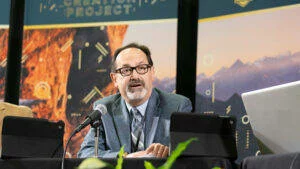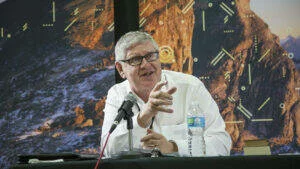 Hans, as always, it is a pleasure to interact with you whether in person or in writing. You raise cogent points that get to the heart of the matter and ask insightful and probative questions. This case is no exception.
Hans, as always, it is a pleasure to interact with you whether in person or in writing. You raise cogent points that get to the heart of the matter and ask insightful and probative questions. This case is no exception.
Let me do my best to respond to your questions in the space available.
Are There Mysteries in Science Just as in Theology?
Human beings have limitations. Thus, every scientific model and every theological tradition is incomplete—and always will be. Some scientific questions are impenetrable to us (at least right now) just as some answers to theological questions lie beyond our grasp. There is mystery in both science and theology.
To be fair, some would argue that the key transitions in life’s history are challenging scientific mysteries. In that regard, I agree that it is reasonable for a life scientist to embrace an evolutionary interpretation of life’s origin, history, and design even in the face of these scientific mysteries.I would argue that I am justified in pointing to these failings as reasons for my skepticism about the evolutionary paradigm’s grand claims. However, it is important to recognize that evolutionary biologists’ conviction isn’t solely based on the scientific evidence for common descent. Their conviction also rests on a deep-seated commitment to methodological naturalism, which forces a de facto commitment to evolutionary explanations and a wholesale rejection of any model with teleological underpinnings, including creation model approaches. Evolutionary biologists won’t abandon their viewpoint even if the problems for the evolutionary paradigm are shown to be intractable instead of inexplicable.
By the same token, I also think it is perfectly reasonable for someone to question the evolutionary paradigm based on failed predictions and the paradigm’s inability to account for key events in life’s history—whether they be impenetrable mysteries or intractable problems. The fact remains that evolution currently can’t account for these mysteries no matter how we view them. So, I would argue that I am justified in pointing to these failings as reasons for my skepticism about the evolutionary paradigm’s grand claims.
How often do we encounter skeptics who reject the Christian faith because of seemingly intractable theological problems, that, as Christians, we label as mysteries? Shouldn’t Christians be afforded the same epistemic privileges when engaging the evolutionary framework?
Are OECs “Cherry-Picking” the Scientific Literature to Justify Skepticism about the Evolutionary Paradigm?
This is a fair question. At Reasons to Believe, we try our best to avoid cherry-picking the scientific literature to support our creation model, just as a good theologian avoids proof texting to support his or her theological position. I cited review articles (and a graduate textbook, in one case) written by experts in each of these respective areas of evolutionary theory in order to support my argument against evolution (as currently conceived). Based on a large number of scientific studies, these experts singularly make the point that the mechanisms that explain microevolution, speciation, and microbial evolution can’t account for four key origins in life’s history: (1) life, (2) eukaryotic cells, (3) body plans, and (4) human exceptionalism.
Does Science or Scripture Hold a Privileged Position?
Of course, for a Christian the politically correct answer to this question is Scripture.
In truth, the answer is not that simple. Both science and theology are interpretive enterprises, shaped by a number of factors, including philosophical and theological convictions. This is one reason why we advocate constructive integration. Our model is never static. We acknowledge a continual push and pull between scientific and theological interpretations. Through this approach, insights from science and theology are given equal—and, hopefully, appropriate—priority. The dynamic interplay between the two interpretations helps keep unwarranted insights from science and theology in check, with the hope of producing a model that is faithful to the scientific evidence at hand (though not necessarily representing mainstream interpretations of that evidence) and Scripture (though not necessarily representing traditional readings of Scripture).
Is It Unwise to Adopt a Concordist Approach to Science and Faith?
In reality, all Christians hold to some form of concordism. Every Christian is a historical concordist—at least when it comes to the life, death, and resurrection of Christ. The person of Christ is central to our faith and we are convinced that the Gospels describe real events that occurred in space and time. Therefore, Christians seek to find a correspondence between the extrabiblical historical and archeological records and the New Testament texts with the goal of demonstrating their credibility.
I suspect that most Christians are, to some extent, also scientific concordists, at least when it comes to biblical concepts such as the constancy,Many Christians are hesitant to embrace a fully-orbed scientific concordism because the creation accounts found in Scripture were written in a pre-scientific era and, accordingly, should not be read through the lens of modern science. regularity, and intelligibility of nature. This view of nature contributed to the intellectual foundation that helped birth modern science in Christian Europe. It still undergirds science today.
So, why draw the line at natural history? Why adopt a historical concordist approach with regard to biblical narratives that involve human history, but reject scientific concordism with the biblical passages that describe divine natural history? Why adopt a limited form of scientific concordism when it comes to the regularity of nature and its intelligibility, but shy away from a concordist approach when it comes to historical descriptions of God’s work as Creator?
In my experience, many Christians are hesitant to embrace a fully-orbed scientific concordism because the creation accounts found in Scripture were written in a pre-scientific era and, accordingly, should not be read through the lens of modern science. I am sympathetic to this concern, but I believe this apprehension fails to fully account for the Holy Spirit’s inspiration. Clearly, these texts were written to communicate to pre-scientific people. However, is it unreasonable to think that the Holy Spirit would inspire the author so that the biblical texts also present a true and accurate description of the universe and natural history—one that anticipates future scientific advances? It doesn’t make sense that the Holy Spirit would inspire erroneous ideas about the natural world when he could just as easily inspire an accurate depiction of nature. Even if the ideas were communicated in a way that prescientific people could grasp, they would still be accurate.
What about the concern of marrying our interpretation of Genesis 1 (and other creation accounts) to scientific knowledge, which is provisional and always changing? Our constructive integration approach addresses this concern. By dynamically spiraling between scientific and theological interpretations, as new scientific advances and theological insights develop—with each one informing the other—we think that it is possible to arrive at a robust creation model that avoids imbalance.
In other words, our constructive integration approach is “not your grandfather’s concordism.”
The Pesky Problem of Neanderthal Interbreeding
To be clear, the issue of interbreeding between modern humans, Neanderthals, and Denisovans is a sticky issue. Our human origins model regards hominids as animals created biologically and behaviorally distinct from modern humans. In the expanded and updated edition of Who Was Adam? we acknowledge the problems the interbreeding issue causes for our model and concede that it is a failed prediction.
Having forfeited this point, we don’t see interbreeding as fatal to our model. We think that we can accommodate it, though admittedly it does require a less-than-ideal scenario, as you alluded to. We wish it weren’t so, but we don’t see any way around the genetic evidence for interbreeding. It does not appear possible to maintain scientific integrity while rejecting the studies that conclude interbreeding took place among modern humans and other hominids. Additionally, we don’t consider it a viable option to view modern humans, Neanderthals, and Denisovans as members of the same species. The scientific data clearly indicates significant differences in modern human and Neanderthal:
- postcranial anatomy
- skull shape
- brain shape
- growth and developmental from infanthood to adulthood
- genetic makeup
- behavioral capacities
This leaves us with the option that interbreeding between modern humans and other hominids occurred as acts of bestiality and the capacity to interbreed reflects common design, not common descent. This scenario does mean that interbreeding shaped us as a human species. More recent research suggests interbreeding introduced some genes into the human gene pool that benefited us as we began to migrate around the world. Perhaps what we intended for evil, God used for good.
It is true that human-hominid interbreeding raises tricky theological issues such as whether or not the resulting hybrids had a soul, etc. Nevertheless, we don’t see such theological issues as game-changers for our human origins model. These types of questions and concerns mean that our work using constructive integration is not done. We believe that more understanding awaits us, as this question (and others) stimulates further scientific and theological investigation.







Comments
Be the first one to make a comment!